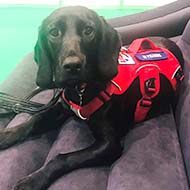
Six-month-old Gracie is the newest member of Service Dogs UK.
A rescue pup is set to become a PTSD assistance dog to help support Armed Forces and emergency services personnel.
Six-month-old Gracie arrived at Dogs Trust West London Rehoming Centre in July after her owner’s circumstances changed and they could no longer take care of her.
Now the springadore - a Labrador spaniel crossbreed - is learning to become the newest Service Dogs UK recruit and will help improve the lives of veterans, who can often feel very isolated, depressed and struggle with daily life and relationships.
Gracie was put forward for the role by Richard Moore, Dogs Trust West London rehoming centre manager, who said: “We’ve worked with Service Dogs UK a few times before and as soon as I met Gracie I thought she’d be a great candidate for them, and it sounds like I was right!”
PTSD is a mental health condition often described as a ‘living hell’ for the person suffering. Those diagnosed with the disorder may suffer flashbacks, nightmares, feelings of suicide and uncontrollable thoughts, among other symptoms.
Through engaging with their veteran partners, PTSD assistance dogs help individuals overcome emotional numbness and give them new ways to communicate without anger or paranoia. Many veterans feel their assistance dogs provide a sense of purpose and the ability to “feel” and live again.
Trained assistance dogs help perform specific tasks that make day-to-day life easier for the veteran, such as waking them from nightmares, responding to medication reminders and offering behaviours to counter flashbacks and anxiety attacks.
Jane Hoare, foster liaison at Service Dogs UK, assesses the dogs and teaches them some basic manners before working with veterans and their paired dogs for up to a year.
Commenting on Gracie’s appointment, Jane said: “We don’t usually have dogs as young as Gracie, and we were unsure how it would go, but she’s absolutely wowed everyone,” she said.
“After three weeks, we took her to the emergency services show at the NEC where she was the perfect Ambassadog, and two weeks ago she met HRH the Duke of Kent when he visited us to find out more about our work.
“Gracie hasn’t been paired with a veteran yet, but as soon as she finds a match, she’s going to be amazing.”
Image (C) Dogs Trust/Service Dogs UK.



 The BSAVA has opened submissions for the BSAVA Clinical Research Abstracts 2026.
The BSAVA has opened submissions for the BSAVA Clinical Research Abstracts 2026.